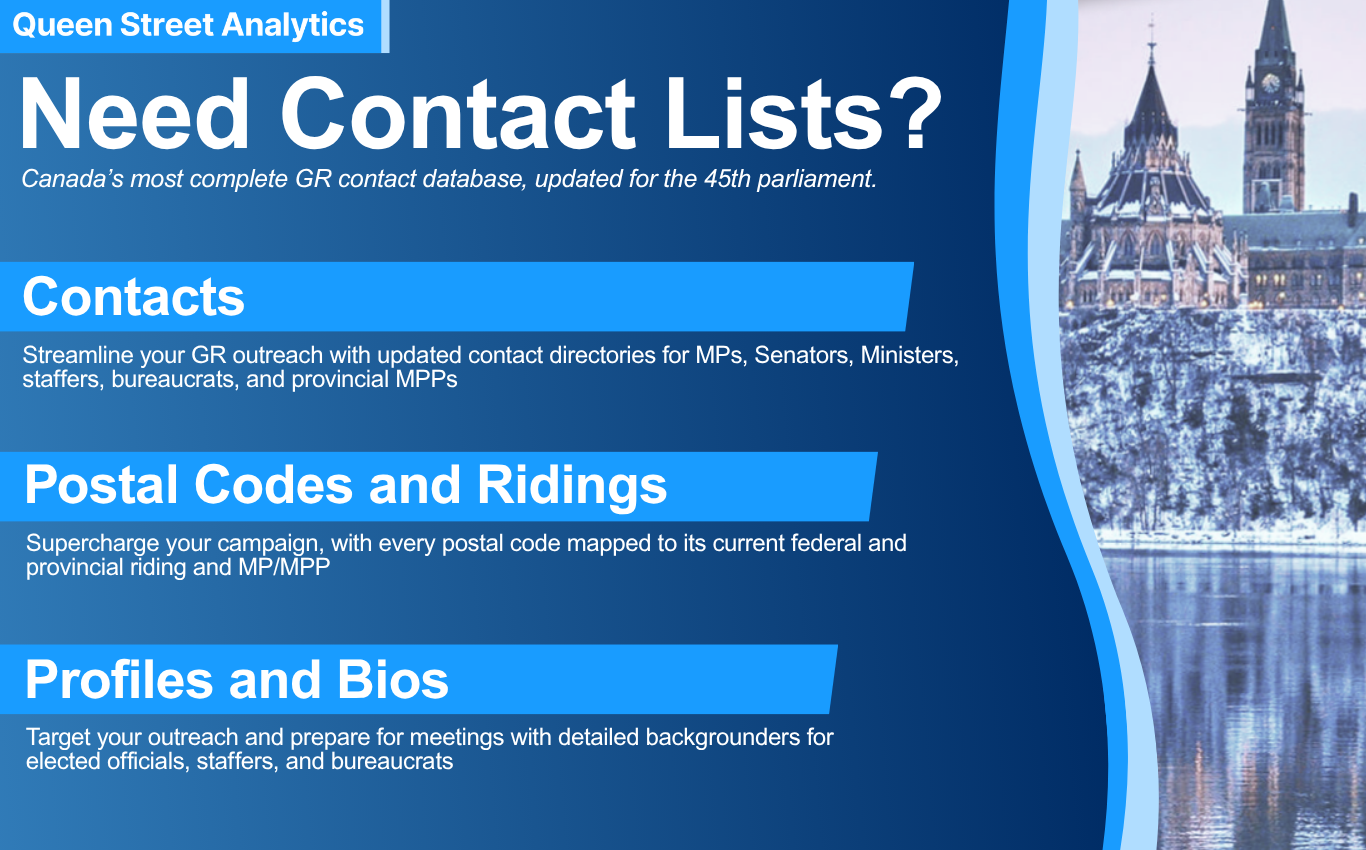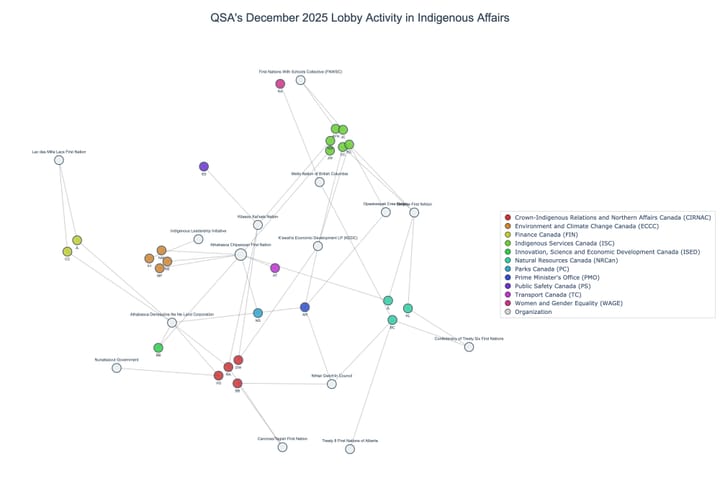QSA's Week in Indigenous Affairs (#29, 2025)
Canada signs $300M grant for major Indigenous land conservation; Flying Dust First Nation reaches $55M land claim settlement; CEPA framework recognizes Indigenous knowledge; US issues call for comment on ICWA technical assistance.

Good morning! This is Queen Street Analytics' weekly roundup of regulatory developments, legislative discussions, political announcements and other government-related news concerning Indigenous communities, First Nations, Inuit, and Métis, and their reserves, territories, and treaty rights. Every Monday, we break down the most important updates in this space in under five minutes.
Want to see GR activities in areas related to Indigenous Affairs? Don’t miss this week’s updates in Social Issues and Environment.
Dates: 2025-07-20 to 2025-07-26
📋 In This Week's Newsletter
• 🇨🇦 Canadian Federal GR News
• 🇺🇸 US Federal GR News
• 🗺️ Canadian Provincial GR News
• 📚 What We're Reading This Week
Canadian Federal GR News
Canada Commits $300 Million to Indigenous-Led Boreal Conservation in Northwest Territories
On July 21, Environment and Climate Change Minister Julie Dabrusin and Danny Yakeleya, Chair of the Our Land for the Future Trust, signed an agreement committing $300 million in federal funding toward 'NWT: Our Land for the Future,' positioning it as one of the largest Indigenous-led conservation efforts globally. The initiative, with an additional $75 million from philanthropic partners, will enable Indigenous stewardship and conservation across 380,000 square kilometres—nearly 30% of the Northwest Territories—supporting ecosystems and sustainable economic activities. The partnership involves 21 Indigenous governments, the federal and territorial governments, and donors, establishing a Project Finance for Permanence model. Key activities will include funding Indigenous Guardians programs, establishing new protected and conserved areas, supporting climate adaptation research, and investing in local conservation economies such as traditional harvesting and ecotourism. Indigenous representatives will make decisions on fund disbursements through a Trust. The project is expected to support hundreds of jobs, advance recognition of Indigenous governance, and simplify conservation planning and project approvals for industry across the North.
Sources: Announcements: www.canada.ca, Announcements: www.canada.ca

Flying Dust First Nation and Canada Reach $55 Million Land Settlement Agreement
Crown-Indigenous Relations and Northern Affairs Canada and Flying Dust First Nation announced a settlement on July 25 to resolve a long-standing treaty land entitlement related to a 1932 expropriation, compensating the First Nation with over $55 million after decades of denied use. The settlement follows the return of most land parcels and addresses coordination with the RCMP and railway stakeholders. Chief Tyson Bear and Minister Rebecca Alty stated that this agreement, years in the making, enables the Nation to pursue plans for development and offers new economic opportunities through Canada's Additions to Reserve process. The process also involved remediation of the land and the formalization of property registration. Leadership continuity and oral tradition were key factors in retaining the land claim focus over several generations. This resolution aligns with ongoing federal commitments under the United Nations Declaration on the Rights of Indigenous Peoples Act.
Sources: Announcements: www.canada.ca
Framework for Healthy Environment Rights under CEPA Incorporates Indigenous Knowledge Systems
Environment and Climate Change Canada has concluded work on the Implementation Framework for the Right to a Healthy Environment under the modernized Canadian Environmental Protection Act (CEPA). The framework offers guidance for decision-makers on substantive and procedural elements, including the integration of environmental justice and recognition of Indigenous knowledge in regulatory and chemicals management. Future decision guidance is being developed collaboratively with Indigenous partners to weave Indigenous knowledge systems with western science in support of CEPA objectives. The plan will address chemical risks, with over 30 substance groups slated for assessment—an approach informed by recent consultations. The updated strategy also aims to support flexible alternatives to vertebrate animal testing in toxicity assessments, reflecting contemporary scientific and ethical considerations. The framework, plan of priorities, and vertebrate animal testing strategy can be accessed through a new government portal.
Sources: Announcements: www.canada.ca
Over $14.4 Million Invested in Youth Environmental Literacy and Indigenous-Led Projects
Minister Julie Dabrusin announced on July 22 an investment exceeding $14.4 million through the Climate Action and Awareness Fund for 17 youth-focused environmental literacy projects nationwide. Of this amount, $3.2 million will fund Indigenous-led initiatives, providing opportunities for Indigenous youth to access environmental education rooted in both Traditional Knowledge and climate science. The BC Parks Foundation in British Columbia, with $1.8 million in funding, will bolster student engagement with climate action and biodiversity in parks, while also receiving matching provincial funding. Funded activities include in-park learning, community outreach, and educational resource development. The announcement positions collaboration between Indigenous communities, academia, government, and private partners as a central component of capacity building among Canadian youth.
Sources: Announcements: www.canada.ca
Canada Plants Trees and Restores Habitat Through Indigenous and Multi-Partner Initiatives in Alberta
On July 21, Parliamentary Secretary Corey Hogan detailed a federal investment over $125 million in Alberta's forestry restoration under the 2 Billion Trees program, supporting projects that involve Indigenous organizations and communities. Project Forest and First Indigenous Biomass Future Inc. are leading work to plant over a million trees and rehabilitate collective and cultural lands, including on the Siksika Nation reserve and 65 hectares near Cardiff. Efforts include jobs creation, knowledge transmission, youth training through university partnerships, and the advancement of Indigenous-led forest stewardship. The Caribou Habitat Recovery Program will expand through a Canada-Alberta agreement, targeting vegetation restoration across 15 caribou ranges.
Sources: Announcements: www.canada.ca
Funding Announced for Community Health Outreach on Drug Crisis with Indigenous Partnerships
Minister Marjorie Michel announced on July 21 that Health Canada will provide $2.8 million to four projects in Atlantic Canada under the Emergency Treatment Fund, including outreach in Fredericton, NB. These initiatives target urgent needs in municipalities and First Nations, Inuit, and Métis communities affected by the illicit drug and overdose crisis. The support encompasses mobile outreach expansions, overnight services, naloxone distribution, and linkage to health and harm reduction services.
Sources: Announcements: www.canada.ca
Minister Hajdu Addresses Indigenous Partnerships at UN Sustainable Development Forum
On July 24, Minister Patty Hajdu represented Canada at the UN High-Level Political Forum on Sustainable Development in New York. She addressed Canada’s progress in advancing the SDGs, including work with Indigenous Peoples. Hajdu, together with Ambassador Bob Rae, took part in a High-Level Dialogue on Adequate Housing for All, which included discussion of inclusion and equity considerations for Indigenous and minority communities. The session also included the announcement of a Canada-Moldova Social Security Agreement and a side event on inclusive, sustainable jobs, exploring engagement with digital education and the private sector.
Sources: Announcements: www.canada.ca
Statistics Canada Releases Indigenous Languages Visualization Tool
On July 22, Statistics Canada launched an interactive data visualization tool focused on Indigenous languages, intended to support efforts in language revitalization, tracking vitality, and enabling access to cultural and linguistic data for service providers, educators, and Indigenous institutions.
Sources: Open Government Data Set: www.statcan.gc.ca
US Federal GR News
HHS Requests Comment on Technical Assistance and Reporting for Indian Child Welfare Act
On July 22, the Administration for Children and Families (ACF) published a Federal Register notice seeking public input from States, Tribes, and relevant agencies regarding technical assistance implementation under the Indian Child Welfare Act (ICWA), administrative burden reduction for Title IV-B programs, and the Court Improvement Program. Recent legislative amendments in Public Law 118-258, effective October 1, 2025, direct HHS to consult Tribes and States to devise a plan for ICWA technical assistance, including notification protocols, recordkeeping, and transfer of jurisdiction. Comment is also sought on new requirements to reduce administrative reporting by 15%, with special consideration for Tribes receiving smaller funding allotments. Additional topics include best practices for virtual court hearings involving ICWA cases and increased funding for the Tribal Court Improvement Program. Input is requested by September 22, 2025, and the findings will inform HHS policy and regulatory changes under Title IV-B.
Sources: U.S. Federal Announcements: www.federalregister.gov
US Sentencing Commission Seeks Applicants for Tribal Issues Advisory Group
The United States Sentencing Commission announced a vacancy in the Tribal Issues Advisory Group, inviting interested individuals with expertise in federal sentencing issues affecting American Indian and Alaska Native communities to apply by September 19, 2025. The advisory group, composed of up to nine members representing the judiciary, executive branches, tribal courts, public defenders, and at-large tribal stakeholders, is tasked with providing guidance on sentencing policies and priorities as they pertain to Indian country and Indigenous populations.
Sources: U.S. Federal Announcements: www.federalregister.gov
NSF Calls for Input on National Arctic Research Plan, Including Tribal Consultation
On July 21, the National Science Foundation, as chair of the Interagency Arctic Research Policy Committee (IARPC), issued a solicitation for public comment to inform the National Arctic Research Plan for 2027–2031. The updated plan will set priorities for federally funded research in the Arctic, with a focus on issues such as community resilience, stewardship, risk mitigation, and interactions among Arctic systems. The current plan includes Tribal consultation and effective processes as a foundational activity. Stakeholders have until October 15, 2025 to submit feedback on policy, research needs, and recommendations related to the Arctic's Indigenous residents and governance.
Sources: U.S. Federal Announcements: www.federalregister.gov
State Department Authorizes Import of Culturally Significant Australia Indigenous Art
The Department of State has issued a notice approving the temporary import and exhibition of culturally significant Australian Indigenous artworks for the 'The Stars We Do Not See: Australia Indigenous Art' exhibition. The show will tour institutions including the National Gallery of Art (Washington DC), Denver Art Museum, Portland Art Museum, and Peabody Essex Museum, following determinations that these works are of national interest to the US and eligible for public display under relevant statutory authority.
Sources: U.S. Federal Announcements: www.federalregister.gov
Canadian Provincial GR News
Ontario Hosts First Ministers and Indigenous Leaders for Economic Development Discussion
Premier Doug Ford convened premiers with national Indigenous organization leaders in Muskoka to discuss economic reconciliation, Indigenous equity participation in resource development, and strategies for building resilient, self-reliant economies.
Sources: Provincial Announcement: news.ontario.ca
Snuneymuxw First Nation Receives 700 Hectares in Mount Benson North Land Transfer
The BC government completed a transfer of over 700 hectares of land to Snuneymuxw First Nation under a 2020 agreement, supporting economic development, stewardship, and self-determination through the Nation's Petroglyph Development Group.
Sources: Provincial Announcement: news.gov.bc.ca
Lake Babine Nation's Woodland Licence Grows Twentyfold in Forestry Partnership
Lake Babine Nation, in collaboration with West Fraser and the Province of British Columbia, has expanded its First Nations Woodland Licence from 5,600 to 126,000 hectares, furthering Indigenous-led forestry and economic development.
Sources: Provincial Announcement: news.gov.bc.ca
Ontario Funds Forest Biomass Projects with Indigenous Partnerships
The Ontario government announced more than $6.2 million in funding for eight forest biomass innovation projects in Northwest Ontario, supporting Indigenous communities including Bingwi Neyaashi Anishinaabek, Kitchenuhmaykoosib Inninugug, and Pikangikum First Nation for capacity building and sustainable forest resource development.
Sources: Provincial Announcement: news.ontario.ca
Manitoba Invests $55.2 Million in Norway House Cree Nation Infrastructure
Manitoba announced investments supporting infrastructure upgrades and new transportation projects in Norway House Cree Nation, aiming to reduce isolation and support economic growth. The package includes a new airport terminal and feasibility study for a permanent bridge to replace the Sea Falls Ferry.
Sources: Provincial Announcement: news.gov.mb.ca
What We're Reading This Week
- Indigenous leaders push for meeting with first ministers as Ford takes softer tone on development: Calls for high-level engagement on Indigenous priorities in development projects.
- Watchdog suggests review of how RCMP interact with Indigenous people, mental health calls: Watchdog considers oversight on RCMP response to Indigenous communities in crisis situations.
- Report raises questions about First Nations ownership in major projects: A new report reviews frameworks for First Nations equity in resource projects.
- Meeting with Carney offered reassurances over major projects bill, says Inuit leader: Inuit leaders met with Mark Carney for clarifications regarding proposed federal legislation affecting treaty rights.
- Carney, Inuit leaders talk major projects law amid treaty rights concerns: Discussions continue between policymakers and Inuit leadership about implications of new project approvals law.
- U of S works on new way to educate Indigenous youth: University of Saskatchewan develops new educational approaches tailored for Indigenous youth.
- First Nations call off talks on forestry bill, say Quebec disrespecting rights: Several First Nations suspended discussions over Quebec's forestry reform bill.
- Carney to meet Inuit leaders to discuss Bill C-5: Upcoming talks scheduled over federal Bill C-5 affecting Indigenous rights.
- Report raises questions about First Nations ownership in major projects: Ownership models for Indigenous participation in large-scale developments are under review.

